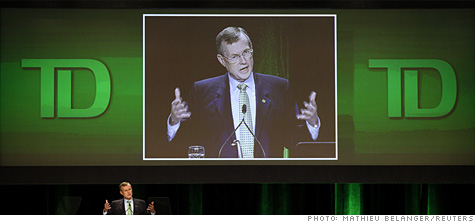 TD Bank president and CEO Ed Clark speaking at his company's annual shareholders meeting in March.
TD Bank president and CEO Ed Clark speaking at his company's annual shareholders meeting in March.
(Fortune) -- With many of their rivals on the ropes, Canada's major banks are nicely positioned to catapult into the top tier of U.S. financial institutions -- for the first time ever.
The main reason is that the country's banks famously skated through the subprime and derivatives meltdown of 2008 with no government bailouts and comparatively few writedowns. As a result they replaced their Swiss rivals as the international standard for banking excellence and readied themselves for cherry-picking the best assets in the distressed banking industry south of the border.
On the surface, it looks like they're on a U.S. buying spree. Since mid-April, three major Canadian banks -- TD Bank Financial Group, Bank of Montreal (BMO) and Bank of Nova Scotia -- have collectively acquired six failed U.S. institutions. All the acquisitions were cautiously negotiated with the U.S. Federal Deposit Insurance Corp. (FDIC), which is taking on a heavy share of the potential loan losses.
But critics say the Big Five are playing it too safe, content to remain third- and fourth-string players in the U.S. markets where they operate, when they should be aiming for the No. 1 spot. If ever there was a time to do it, it's now, but Canadian banks don't seem to have the nerve to bust out and become truly global players.
That kind of reticence from the boardroom could be fatal for the future of Canada's major banks, who run the risk of growing stagnant behind cushy domestic regulations that make it impossible for foreign rivals to compete on an equal footing. Consider that the six recent acquisitions add up to a mere US$22 billion in new assets for the buyers. That's about 1% of total assets for these pillars of Toronto's Bay Street -- little more than a token gesture to make it seem Canada's banks are not entirely asleep at the wheel.
Analyst Michael Goldberg with Toronto-based Desjardins Securities agrees the U.S. market offers a rich opportunity for Canada's super-capitalized banks. "TD in recent years has been most aggressive in building its U.S. franchise," he says. "But reaction has been mixed. Some investors are very skeptical anytime Canadian companies buy anything in U.S."
Earlier this month, TD Bank (TD) acquired South Financial Group for US$61 million, adding more than 100 branches to its 1,000-plus locations in the Maine-to-Florida corridor. This follows on the heels of buying three small Florida-based institutions closed by regulators.
BMO (BMO), which bought assets of failed Illinois lender Amcore Bank, adds 52 branches in Illinois and Wisconsin, building on an existing network of 288 branches at its Harris subsidiary. Toronto-based BMO made its big U.S. push with its C$718 million (US$682.1 million) acquisition of Harris in 1984. It has since spent about C$2.5 billion (US$2.4 billion) buying U.S. banks, but only reached the No. 3 spot in Illinois by deposits.
Scotiabank (BNS) is the third Canadian lender to take advantage of U.S. government-assisted acquisitions, snapping up R-G Premier Bank of Puerto Rico, building on the 17 branches it already has on the Caribbean island. However rival Banco Popular de Puerto Rico acquired the deposits of Westernbank at the same time, securing its position as the largest insured bank on the island, despite the fact that Scotiabank has been doing business in tiny Puerto Rico for 100 years.
Canada's big banks can afford to casually dabble in foreign markets because their domestic operations are reliable money-making machines that deliver billions of dollars in profit quarter after quarter.
But those profits come at the expense of Canadian consumers and small businesses, poorly served by a clubby group of banks whose domestic operations are perhaps the least competitive in the Organization for Economic Co-operation and Development (OECD), an international group of 31 developed countries, including the U.S., Australia and South Korea, with free-market economies.
If Canada's major banks are not prepared to go big in the U.S., they should just pull stakes and go home ![]()



| Overnight Avg Rate | Latest | Change | Last Week |
|---|---|---|---|
| 30 yr fixed | 3.80% | 3.88% | |
| 15 yr fixed | 3.20% | 3.23% | |
| 5/1 ARM | 3.84% | 3.88% | |
| 30 yr refi | 3.82% | 3.93% | |
| 15 yr refi | 3.20% | 3.23% |
Today's featured rates:



| Company | Price | Change | % Change |
|---|---|---|---|
| Ford Motor Co | 8.29 | 0.05 | 0.61% |
| Advanced Micro Devic... | 54.59 | 0.70 | 1.30% |
| Cisco Systems Inc | 47.49 | -2.44 | -4.89% |
| General Electric Co | 13.00 | -0.16 | -1.22% |
| Kraft Heinz Co | 27.84 | -2.20 | -7.32% |
| Index | Last | Change | % Change |
|---|---|---|---|
| Dow | 32,627.97 | -234.33 | -0.71% |
| Nasdaq | 13,215.24 | 99.07 | 0.76% |
| S&P 500 | 3,913.10 | -2.36 | -0.06% |
| Treasuries | 1.73 | 0.00 | 0.12% |
|
Bankrupt toy retailer tells bankruptcy court it is looking at possibly reviving the Toys 'R' Us and Babies 'R' Us brands. More |
Land O'Lakes CEO Beth Ford charts her career path, from her first job to becoming the first openly gay CEO at a Fortune 500 company in an interview with CNN's Boss Files. More |
Honda and General Motors are creating a new generation of fully autonomous vehicles. More |
In 1998, Ntsiki Biyela won a scholarship to study wine making. Now she's about to launch her own brand. More |
Whether you hedge inflation or look for a return that outpaces inflation, here's how to prepare. More |